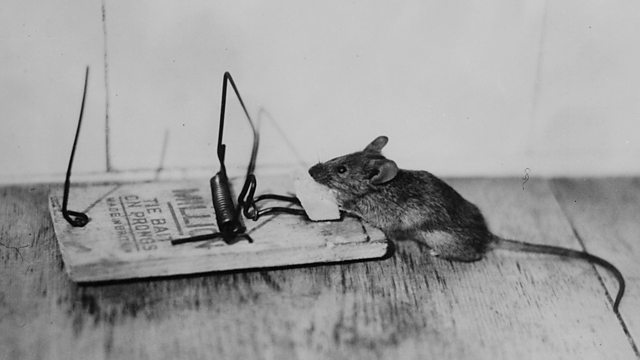Traps
The pitfalls and pleasures of traps and trapping: with astronomer and neutrino hunter Ray Jayawardhana, games designer Margaret Robertson and wildlife ecologist Bill McShea.
This week Quentin Cooper talks to three people who are each guilty of very different charges of entrapment: astronomer Ray Jayawardhana is part of a movement building the most elaborate and expensive traps to snare the most elusive prey of all – neutrinos; games designer Margaret Robertson lures us into them for our own pleasure – the trick, though, is making them just sticky enough to evade or escape from, to keep players coming back for more; and wildlife ecologist Bill McShea uses ever-improving digital technology to develop cunning camera traps that catch glimpses of animals in the wild without disturbing their normal behaviour.
(Photo: A mouse and a mouse trap. Credit: Getty Images)
Last on
Clip
-
![]()
Game designer Margaret Robertson: time-travel in computer games?
Duration: 01:13
Chapters
-
Ray Jayawardhana
The challenge of trapping neutrinos
Duration: 13:45
Margaret Robertson
Designing traps for game players
Duration: 09:15
Bill McShea
Developing camera traps to capture animals in the wild
Duration: 13:15
60 Second Idea - Do animals need lawyers?
Duration: 04:15
Ray Jayawardhana
![Ray Jayawardhana]()
Ray Jayawardhana is an astronomer at the University of Toronto. He holds a Canada Research Chair in Observational Astrophysics and is an award-winning science writer. His latest work is Neutrino Hunters: The Thrilling Chase for a Ghostly Particle to Unlock the Secrets of the Universe.
Margaret Robertson
![Margaret Robertson]()
As president ofΒ Hide&Seek NY, Margaret has made big games (like the city-wide 12,000 player New Year Games), small games (like the Tiny Games project), silly games (like Drunk Dungeon) and serious games (like Dreams Of Your Life). She was editor-in-chief of Edge magazine, and part of the team behind the GameCity festival,Β and is a sought-after speaker on game design theory.
Bill McShea
![Bill McShea]()
Bill McShea is an ecologist at the US National Zoo’s facility in Front Royal Virginia with special interest in wildlife management and conservation. He is a pioneer in the use of camera traps technology to describe and understand animal distributions on a landscape scale. Recent projects include deer ecology in Burma, Thailand and Cambodia; large mammal surveys and the distribution of Asiatic black bears in China; and mapping large mammal use of forest corridors in China.
60 Second Idea to Change the World
![60 Second Idea to Change the World]() Bill McShea says that popular animals and plants should get themselves a lawyer who will trademark their name.Β So all companies that use elephants, tigers, jaguars etc. as their company logos should pay a fee for that use, and all schools and sports clubs that use tigers, eagles, bears etc. for their names and mascots pay as well. And all housing developments called Maple Springs, Linden Grove, Oak Ridge should pay a fee too. These fees would go to conservation organisations that actually support the animals and plants these entities trumpet, and also to preserving those creatures that are not as glamorous but just as important, ie snails and slime moulds.
Bill McShea says that popular animals and plants should get themselves a lawyer who will trademark their name. So all companies that use elephants, tigers, jaguars etc. as their company logos should pay a fee for that use, and all schools and sports clubs that use tigers, eagles, bears etc. for their names and mascots pay as well. And all housing developments called Maple Springs, Linden Grove, Oak Ridge should pay a fee too. These fees would go to conservation organisations that actually support the animals and plants these entities trumpet, and also to preserving those creatures that are not as glamorous but just as important, ie snails and slime moulds.In Next Weeks’ Programme
Megaprojects, such as Olympic infrastructure or super-tall buildings have a tendency to go vastly over budget and to deliver much smaller benefits than envisaged -Β so why do we persist in starting new ones? Is it just vanity? With economist Bent Flyvbjerg, cultural critic Stephen Bayley and anthropologist Alex Edmonds.
Broadcasts
- Sat 1 Feb 2014 22:06GMTΒι¶ΉΤΌΕΔ World Service Online
- Sun 2 Feb 2014 10:06GMTΒι¶ΉΤΌΕΔ World Service Online
- Mon 3 Feb 2014 03:06GMTΒι¶ΉΤΌΕΔ World Service Online
Do you think political or business leaders need to be charismatic? Or do you prefer highly competent but somewhat stern people?
Podcast
-
![]()
The Forum
The programme that explains the present by exploring the past








